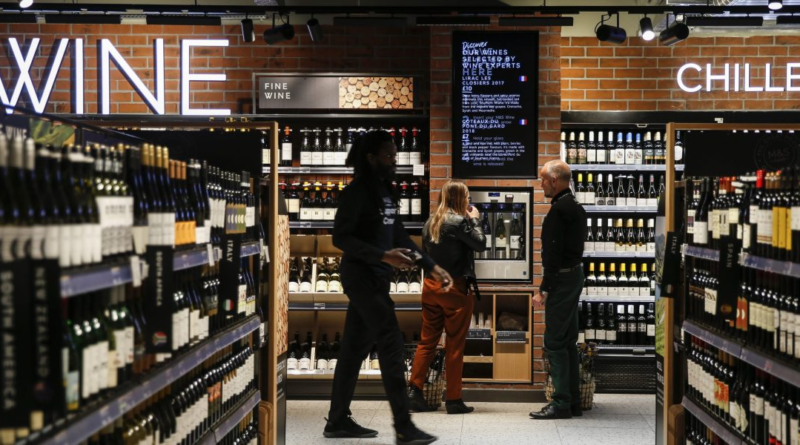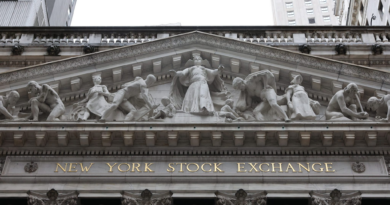Food prices cool in the U.K. as inflation slips 3.4% in February
UK inflation fell more sharply than expected to the lowest level in 2 1/2 years, keeping the Bank of England on track to reduce interest rates later this year.
The Consumer Prices Index rose 3.4% in February from a year earlier, slower than the 4% pace the month before, the Office for National Statistics said Wednesday. The figure was lower than the median of 3.5% predicted by economists and the BOE.
BOE Governor Andrew Bailey has signaled he needs to see further evidence that price pressures will fall back sustainably to the 2% target before easing off on the benchmark lending rate. Officials are expected to leave interest rates at a 16-year high of 5.25% on Thursday, with financial markets only fully pricing in the first cut in August.
A core measure excluding energy, food, alcohol and tobacco fell as expected to 4.5% from 5.1%. But a key metric for policymakers — inflation in the services sector — fell less than expected to 6.1% from 6.5%.
“Inflation is heading in the right direction and should fall below the Bank of England’s 2% target sometime in the Spring,” said Alpesh Paleja, lead economist at the CBI. “However, the path beyond this is likely to be bumpy. Shifting base effects mean that it will likely rise back above 2% later in the year.”
The pound whipsawed after the release, briefly falling to a day’s low of $1.27 before erasing losses. Sterling is the best-performing major currency against the dollar this year on expectations the BOE will hold rates higher for longer than other central banks.
While services inflation came in above economists’ expectations, it was in line with the BOE’s projections and was the lowest in more than a year. Officials are watching services prices closely for signs of domestically generated inflation and wage growth fueling price rises. Rate-setters have warned that services inflation and wage growth remain far too high to keep inflation at the 2% target sustainably.
Food prices and costs in restaurants and cafes helped to drag down the inflation rate, the ONS said. There was upward pressure from motor fuel, housing and household services. The figures are based on an updated basket of goods and services, as is the usual practice at the start of each year.
Soaring food bills were one of the biggest drivers of the double-digit inflation seen in the UK after the war in Ukraine pushed up grains prices and boost costs for farmers for fuel, feed and fertilizer. The ONS said that food and non-alcoholic drink prices rose 5%, the lowest since before the Russian invasion and down sharply from 6.9% in January. Inflation in restaurants and hotels cooled to 6% from 7.1%.
The latest reading bring the UK closer to the inflation levels prevailing in the US and euro area, where policymakers are preparing to ease off on the monetary tightening imposed to get prices under control after the pandemic.
Prices are expected to slow further this month before temporarily dropping below the 2% target in April.
BOE rate-setters may want to see April’s inflation and wages data before shifting to rate cuts when they will be weighing a large fall in energy bills, a wave of pay settlements for workers and the impact of annual increases in bills tied to previous inflation rates, such as mobile phone plans.
Britain had the worst inflation in the Group of Seven nations last year after a jump in food and energy prices prompted workers to demand higher wages.
Living standards are now improving as wage growth outstrips price increases. However, the economy appears to recovering only slowly from a technical recession last year triggered by soaring interest rates and a cost-of-living crisis. The labor market, a key area of concern for BOE inflation fighters, is also showing signs of weakening.
It leaves Prime Minister Rishi Sunak facing a bleak backdrop for fighting a general election expected to be held in the second half of this year. The BOE and private-sector economists expect growth of just 0.3% this year, leaving Britain trailing most advanced economists for another year.
“The outlook for consumers is brightening,” said Zara Nokes, global market analyst at JPMorgan Asset Management. “While the Bank of England will also cheer the decline in the headline figure, it is unlikely to be convinced that the battle against inflation is won.”
Chancellor of the Exchequer Jeremy Hunt, whose party is trailing in polls, sounded an optimistic note after the report.
“This sets the scene for better economic conditions, which could allow further progress on our ambition to boost growth and make work pay,” Hunt said in a statement, adding that it will only happen “if we can do so without increasing borrowing or cutting funding for public services.”
Investors have pushed back expectations for rate reductions this year, fully pricing in the first quarter-point cut in August and only one more move of that size by the end of the year. At the start of the year they were betting on 1.25 percentage points of cuts in 2024.



